
Russell Ira Crowe is an actor. He was born in New Zealand, spending 10 years of his childhood in Australia and residing there permanently by age 21. He has earned various accolades, including an Academy Award, two Golden Globe Awards, and a British Academy Film Award.

Parramatta is a satellite city of Sydney, Australia's largest city and the capital of New South Wales. It is the primary central business district (CBD) for Greater Western Sydney, located approximately 24 kilometres (15 mi) west of Central Sydney, on the banks of the Parramatta River.

Stadium Australia is a multi-purpose stadium located in Sydney Olympic Park, a suburb of Sydney, New South Wales, Australia. The stadium, which is sometimes referred to as Sydney Olympic Stadium, Homebush Stadium or simply the Olympic Stadium, was completed in March 1999 at a cost of A$690 million to host the 2000 Summer Olympics. The Stadium was leased by a private company, the Stadium Australia Group, until the Stadium was sold back to the NSW Government on 1 June 2016 after NSW Premier Michael Baird announced the Stadium was to be redeveloped as a world-class rectangular stadium. The Stadium is owned by Venues NSW on behalf of the NSW Government.

Cockatoo Island Wareamah is a UNESCO World Heritage Site at the confluence of the Parramatta River and Lane Cove River in Sydney Harbour, New South Wales, Australia.

Greater Western Sydney (GWS) is a large region of the metropolitan area of Greater Sydney, New South Wales (NSW), Australia that generally embraces the north-west, south-west, central-west, far western and the Blue Mountains sub-regions within Sydney's metropolitan area and encompasses 11 local government areas: Blacktown, Blue Mountains, Camden, Campbelltown, Cumberland, Fairfield, Hawkesbury, Liverpool, Parramatta, Penrith and Wollondilly. It includes Western Sydney, which has a number of different definitions, although the one consistently used is the region composed of ten local government authorities, most of which are members of the Western Sydney Regional Organisation of Councils (WSROC). The NSW Government's Office of Western Sydney calls the region "Greater Western Sydney".

The Parramatta Eels are an Australian professional rugby league football club based in the Sydney suburb of Parramatta that competes in the National Rugby League (NRL).

The Division of Parramatta is an Australian electoral division in the state of New South Wales. The division was created in 1900 and was one of the original 65 divisions contested at the first federal election. It is named for the locality of Parramatta. The name Parramatta has been sourced to an Aboriginal word for the area. The Darug people had lived in the area for many generations, and regarded the area as a food bowl, rich in food from the river and forests. They called the area Baramada or Burramatta ("Parramatta") which means "the place where the eels lie down".

Ahmad Elrich is an Australian professional association footballer who plays as a right winger for Australian club Parramatta FC. Born in Australia to Lebanese parents, Elrich represented his native country internationally, both at youth and senior level.

Ashley Harrison is an Australian former professional rugby league footballer who played as a lock in the 2000s and 2010s.
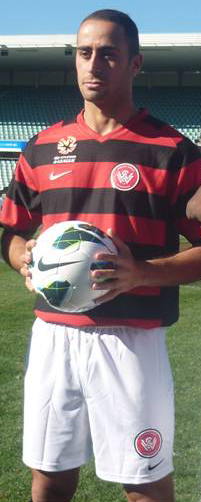
Tarek Elrich is an Australian professional soccer player who plays as a right-back or midfielder for Parramatta FC in NSW League Two.
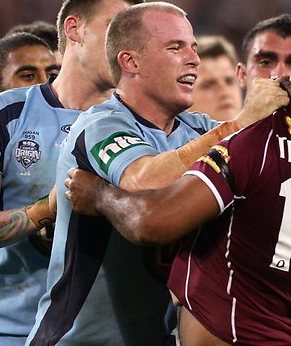
Beau Scott is an Australian former professional rugby league footballer who played in the 2000s and 2010s in the National Rugby League (NRL). An Australia international and New South Wales State of Origin representative second-row, he could also play centre and lock. He played for the Cronulla-Sutherland Sharks, St. George Illawarra Dragons, the Newcastle Knights and the Parramatta Eels.
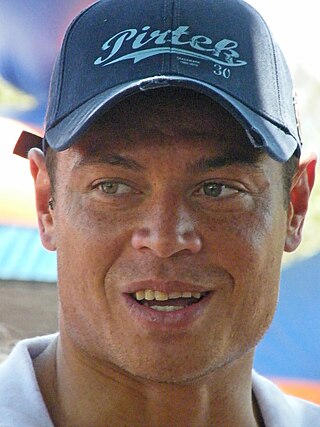
Timana James Aporo Tahu is an Australian former professional rugby league and rugby union footballer. He last played for Denver Stampede in the US PRO Rugby competition. A dual-code international representative three-quarter back for Australia's Kangaroos and then the Wallabies, he could also play second-row and played for New South Wales in State of Origin. Tahu started his career in the National Rugby League for the Newcastle Knights, with whom he won the 2001 NRL Premiership before moving to the Parramatta Eels. He then played for the New South Wales Waratahs in the Super Rugby competition. Tahu returned to the NRL with the Eels and then the Penrith Panthers before finishing his NRL career where it started with the Newcastle Knights.
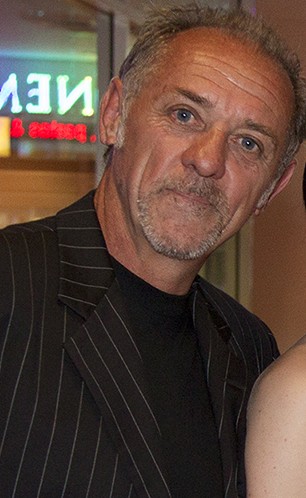
David Field is an Australian character actor and film director. He is known for his roles in the 1999 film Two Hands and as Detective Superintendent Terry Jarvis in the TV series City Homicide.
The 1978 NSWRFL season was the 71st season of the NSWRFL Premiership, Sydney's professional rugby league football competition, and Australia's first. Twelve clubs, including six of 1908's foundation teams and another six from around Sydney competed for the J.J. Giltinan Shield and WD & HO Wills Cup during the season, which culminated in a grand final between the Manly-Warringah and Cronulla-Sutherland clubs that was drawn and had to be re-played. NSWRFL teams also competed for the 1978 Amco Cup.
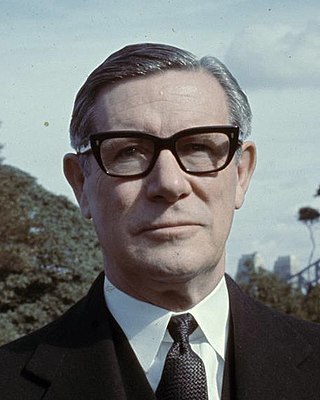
Sir Nigel Hubert Bowen, was a Canadian-born Australian lawyer, politician and judge. He was a member of the Liberal Party and served in the House of Representatives from 1964 to 1973, representing the New South Wales seat of Parramatta. He held senior ministerial office in multiple Coalition governments, serving as Attorney-General, Minister for Education and Science (1969–1971), and Minister for Foreign Affairs (1971–1972). After the Coalition lost the 1972 election he was an unsuccessful candidate to replace William McMahon as Liberal leader, losing to Billy Snedden by a single vote. After leaving politics he served as the inaugural chief justice of the Federal Court of Australia (1976–1990).
Bilal Dib, known as Billy Dib, is an Australian professional boxer. He held the IBF featherweight title from 2011 to 2013, and the IBO super-featherweight title in 2008.
The 2009 National Rugby League season consisted of 26 weekly regular season rounds, starting on 13 March and ending on 6 September, followed by four weeks of play-offs which culminated in the grand final on 4 October.

Tim Mannah is a former Lebanon international rugby league footballer who played as a prop for the Parramatta Eels in the NRL.

Corey Norman is an Australian professional rugby league footballer who last played as a stand-off, scrum-half and fullback for the London Broncos in the Betfred Super League.

Real Steel is a 2011 American science fiction sports film starring Hugh Jackman and Dakota Goyo and co-produced and directed by Shawn Levy for DreamWorks Pictures. The film is based on the short story "Steel", written by Richard Matheson, which was originally published in the May 1956 edition of The Magazine of Fantasy & Science Fiction, and later adapted into a 1963 Twilight Zone episode. The film features a former boxer (Jackman) whose sport is now played by robots. He must build and train his own robot with his son. Real Steel was in development for several years before production began on June 24, 2010. Filming took place primarily in the U.S. state of Michigan. Animatronic robots were built for the film, and motion capture technology was used to depict the rodeo brawling of computer-generated robots and animatronics, respectively.
















